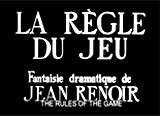
|
The Rules of the Game (1939,
Fr.) (aka La Regle du Jeu)
In director Jean Renoir's great classic set at the
start of World War II - a satirical observation and harsh critique
of bourgeois life and the social class system - it was a dark upstairs-downstairs
bedroom farce and comedic psychological drama concerning the many
multi-layered and interlinked affairs, infidelities and liaisons
of the upper-class aristocrats and the lowly servants (basically
three major love triangles) - presented with impressive deep-focus
cinematography; the film presaged the end of an era in 1939 when
upheavals were about to occur - and due to its controversial themes
was burned during Nazi occupation and was forgotten for many decades
before it was rediscovered:
- the opening sequence: the arrival of famous and
heroic pilot André Jurieux
(Roland Totaine) at the Le Bourget Airfield near Paris, who had
just made a record-breaking, solo flight across the Atlantic; he
had journeyed due to his passionate love affair with the married
Christine de la Chesnaye (Nora Gregor), an Austrian upper-class
aristocrat; he was greeted by his middle-aged, clownish, low-brow
friend Octave (Jean Renoir, the film's director); many were made
aware of Andre's love for Christine when he confessed to a radio
reporter that he had been inspired to fly there for the love of
a woman, and was disappointed she wasn't there to greet him: ("I
did this all for her...I made this flight for a woman. She's not
here to welcome me. She didn't even bother"); Octave was disappointed
that Andre did not play the role of a national hero
- meanwhile, Christine was in Paris
(listening to the radio broadcast) - she was in the company of
her maid Lisette (Paulette Dubost), who had been married for two
years to Robert's gamekeeper Edouard Schumacher (Gaston Modot);
Christine's worldly husband of three years was French nobleman
Robert de la Chesnaye (Marcel Dallo); except for Christine, it
was fairly well-known that her husband Robert was having an affair
with a mistress, Genevieve de Marras (Mila Parély)
- Octave became worried over Andre's depressive suicidal
tendencies (about not seeing Christine) when he deliberately attempted
to smash his car into a tree to kill himself; Octave visited and
met separately with Christine and Robert in Paris
to convince them to invite Andre to their palatial
French country mansion known as La Colinière in Sologne
- Christine was the first to agree: ("I don't
want to be the woman who drove to despair the great hero, the idol
of the masses. If his plane crashes, they'll blame it on me. They'll
call me a vamp, public enemy, obstacle to progress"); next,
Octave spoke to Robert who was at first reluctant to let Andre
come - fearing the loss of Christine; Octave felt bad for asking
and said he felt like hiding by jumping into a hole: ("I'd no longer
have to distinguish between good and bad. The
terrible thing is that everyone
has his reasons"); however, Robert was easily persuaded
to let his upset and despairing romantic rival Andre come:
"I'm against barriers, against walls; that's why I'll invite Andre...I
trust Christine. Keeping them apart won't stop them from falling in
love. It's better that they should meet"; Octave joked: "Why not match
Genevieve and Andre?"
- invitations
were being sent out to guests to attend a huge
weekend retreat and hunting party at the de la Chesnaye estate -
where there would occur many illicit romantic liaisons of rich
and poor - and Andre was to be included (as well as Genevieve!)
- the various loving flirtations, entanglements, and
liaisons that occurred before and during the entire week's retreat
between many different partners: between Andre and Christine's
niece Jackie (Anne Mayen), an art student, Lisette with newly-hired
servant and ex-poacher Marceau (Julien Carette) as well as with
Octave, and Christine with both Octave and André (she professed
her love for both and ultimately promised to run away with each
of them)
|
Various Pairings, Romantic Entanglements and Flirtations
|
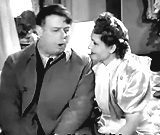
|
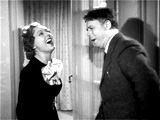
|
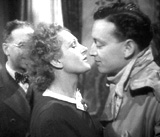
|
|
Christine with Her Confidant Octave
|
Octave with Lisette
|
Christine with Andre
|
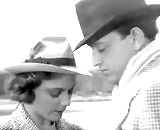
|
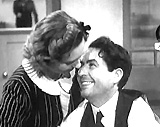
|
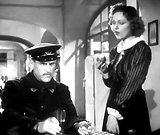
|
|
Jackie with Andre
|
Marceau with Lisette
|
The Jealous Schumacher with His Wife Lisette
|
- the most famous and key scene - the shooting party,
prefaced by the efforts of Robert to reduce the rabbit
population on the grounds without using fences; the entire group
of guests was involved in the graphic, indiscriminate and non-sensical
slaughter of a number of pheasants and rabbits on the grounds (who
were driven from their hiding places by the servants beating the
ground); there was a disturbing shot of a rabbit in the last throes
of dying, clutching its fore-paws to its breast; it presented metaphoric
meaning for what would occur later in the film (amongst other vivid
'killings')
|
The Pheasant and Rabbit Shooting Party
|
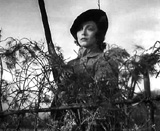
|

|
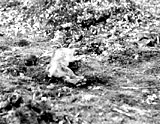
|
- in another area of the hunting field area, Robert
was with his mistress Genevieve; she threatened to tell Genevieve
openly of their affair, to "hurt" him; Robert asked: "What good will
that do you?"; she further explained: "I'm
tired of suffering alone; it might be easier in company. I want to
see your face when Christine leaves, as she will if I tell her"; Genevieve
realized that his love was fading for her - and he confirmed it: "I
don't love you anymore. I have great affection..." - she interrupted
and finished his sentence: "But I bore you...I give up, I can fight hate but not boredom";
tired of everything, Genevieve stated she would permanently leave: "I'll
leave...yes, but I would like you to say good-bye very nicely...a fine
good-bye. For a few seconds, I'd like to go back three years to the time
when there was no Christine. I want you to take me in your arms as you
did then. I'll close my eyes and for a moment believe what I wish for.
Don't say anything. Kiss me"
- at the same time, upper-class
heiress Christine made a "very
interesting" discovery - as she peered through a small set of
telescopic field glass-binoculars, she saw evidence (although misinterpreted)
of her husband Robert's infidelity, when she spotted his farewell
embrace with mistress Genevieve - after Robert had just terminated their
3-year relationship
- that evening, Christine spoke privately to Genevieve
(as she packed to leave) and asked if she had become an "interfering"
wife: "Have I tried to thwart your relations with my husband?"; Genevieve
expressed surprise that Christine knew of their carryings-on; Christine
admitted that her husband Robert wasn't good at keeping secrets and
was a poor liar: "He's really a child. He can't hide anything"; Christine
was somewhat supportive and empathic with Genevieve, and urged her
to stay: "Women have to help each other from time to time. If you're
here, he'll fuss over you and pay less attention to me, which would
suit me rather"
- as the evening's after-dinner entertainment, a Tyrolean
dance was performed, with Octave dressed up as a bear; also, a much
celebrated, darkly disturbing "Dance
Macabre" was provided by
the servants of the house, who were dressed as skeletal figures with
umbrellas; they performed a grotesque dance of death and cavorted among
the rich audience; during the performances, there were more views of
the various trysts and flirtations occurring among the guests - the
dance (and the earlier hunting party) eerily foreshadowed the upcoming
cold murder of lovelorn pilot André Jurieux
|
"Dance Macabre"
|
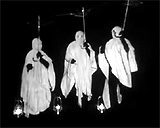
|
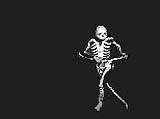
|
- during an interlude,
Robert spoke to Marceau (as his tie was adjusted) and expressed his
opinion of the 'battle of the sexes' - and how he thought Muslims
had the right idea about multiple relations with females - in harems:
"Don't you wish you were an Arab?...Because of the harem...Muslims
alone have shown some logic in the famous battle of the sexes. Of
course, like us, there's always one they prefer, but they don't have
to hurt the rest by throwing them out. I don't want to hurt anyone.
Especially women: that's my tragedy"
- during the music toy scene - Robert, Marquis de la Chesnaye, appeared on stage,
proudly showing off his "latest acquisition" or
toy - he called it "the culmination of my career as a collector" -
a huge music box (calliope) on a stage (adorned with an illustration
of a naked woman) was revealed from behind the curtain, and played
a tune for the guests - the camera made an incredible panning shot
from right to left over the different components of the music machine,
and came to rest on the delighted, giggling face of the host
- during the confusion and havoc of the party, after
Christine requested that Andre run away with her immediately ("Andre,
I'll go away with you right now or never"), she became upset because
Andre wanted to first speak with her husband to follow proper etiquette:
("We must leave with heads high; you'll thank me later"); Robert
and Andre engaged in a fist-fight, while Christine expressed her
upset to Octave about Andre's reluctance to flee, and desire
to follow rules of propriety: "I can't take any more; I've just told
Andre that I love him...he's been talking about etiquette...I expected
him to carry me off in his arms"
- due to the jealousy of Schumacher over his wife Lisette's
flirtations with Marceau, Schumacher pursued him with a loaded gun
and caused considerable damage, pandemonium and disorder amongst
the guests; as a result, Robert fired both of them, Schumacher first
- and then Marceau, rationalizing: "It would be immoral for
me to sack Schumacher and leave you with his wife"; and then
Robert became a peace-maker with Andre and apologized for his bad
behavior: ("I
behaved like the lowest of the low") - realizing the foolishness
of their squabbles; both expressed their love for Christine (Andre: "I
love Christine" Robert: "And I don't? I love her enough
to want her to go with you")
- meanwhile after most of the guests had left, Christine
spoke further to her close friend Octave and expressed her haunted
concern that her 3-year marriage had been "built on a lie"; Octave
tried to comfort her by explaining that everyone lies, so why shouldn't
they as simple folk
- in the outdoor setting of the garden area (where Christine was wearing
Lisette's borrowed cloak with hood), during a sweet, idyllic heart-breaking
sequence, Octave confessed that he was a failure in life and a "parasite" living off
the goodness of others - or otherwise he would have starved; as they
entered the dark and secluded greenhouse ("conservatory"), they were
spied upon by Schumacher and Marceau who thought Octave was romancing
Lisette; she confessed her close friendship for him - she called
him a "fine fellow" (or "good man") and told him "you only
need looking after. I'm going to do that." She
then admitted her love for him: (Christine: "You know, it's you I love.
And you, do you love me?" Octave: "Yes, Christine. I love
you." Christine: "Kiss me, then"); after Octave gave
her a warm peck on the cheek, Christine protested: "On the mouth,
like a lover"; Octave admitted his secret
love (although he knew that she was unsuited for him in terms of
class), and they kissed each other passionately; Schumacher jealously
uttered under his breath: "I'll shoot them both" - mistaking
Christine for Lisette, and went off to retrieve his shotgun
|
The Greenhouse Scene: Octave with Christine
|

|
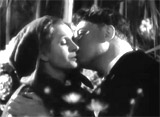
|

|
- the two impulsively decided to romantically
run off together (taking a 3 am train); this would turn out to be
an impossibility when reality intruded upon the scene - due to their
mismatched ages and social classes: (Lisette rightly cautioned: "It's
not right, Octave. It doesn't matter if it's only for a bit of fun,
but young should live with young, old with old....And you've no money;
a woman like Madame has needs; how will you manage?...You're making
a mistake. Madame won't be happy"); everything ended with a tragic
misunderstanding and "accident" nonetheless; Octave had
second-thoughts, saw Andre, and urged him to meet up with Christine
at the greenhouse to run off with her - and then fatefully gave Andre
his overcoat
- in the tragic conclusion (in a case of double mistaken identity after an intertwined
chain of events), both the fired Marceau and gamekeeper Schumacher
(Lisette's jealous husband) observed as Andre walked toward
the greenhouse (wearing Octave's overcoat);
Schumacher again mistook Andre for Octave who he thought was planning
to run off with his wife Lisette; this led to the accidental killing
of Andre in the garden that night - Schumacher shot
him dead; Marceau reported to Robert and Octave that Andre was the
victim (shot "like an animal")
- in the finale, Robert ruled in a public announcement
to those present in the dark cold that the death was a regrettable
accident: "Gentlemen. It was merely an accident. Schumacher thought
he saw a poacher and did his duty. Fate willed Andre Junieu to be
the victim of this error"; one of the guests, Monsieur de St. Aubin (Pierre Nay)
derisively rebuked him - noting: "A new definition of the word accident";
the General (Pierre Magnier) disagreed: "No, no, no, no, no, no. La Chesnaye has a touch of class.
And that's a rare thing nowadays, a rare thing!"
|
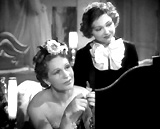
In Paris: Christine de la Chesnaye (Nora Gregor) with
Lisette (Paulette Dubost), Her Maid

Christine at The Weekend Hunting Party
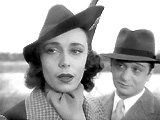
Robert's Farewell to Mistress Genevieve


Christine's Binocular-Viewing of Her Husband
with Genevieve - and Her Misinterpretation of Infidelity
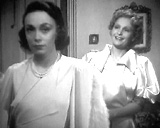
Christine Speaking to Genevieve About Her Affair With Her
Own Husband
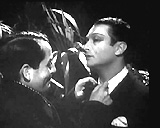
Robert's Discussion with Marceau About Muslim Harems and Women

Evening's Host: Robert Showing Off His Mechanical Toys


A Lighted Calliope

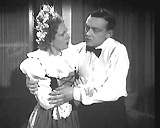
Christine Requesting that Andre Run Away With Her Immediately
- He Was Reluctant
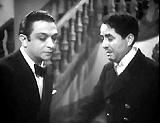
Robert's Firing of Schumacher - and Also Marceau
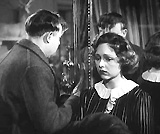
Lisette's Cautioning of Octave About Foolishly Running
Away with Christine


The Accidental Murder In the Dark of Pilot Andre by Schumacher,
Standing next to Marceau
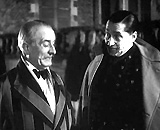
(r to l): Monsieur de St. Aubin and the General - The Film's Last Two
Lines of Dialogue
|


















